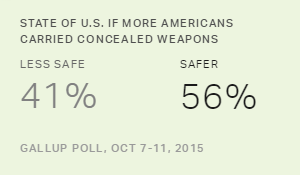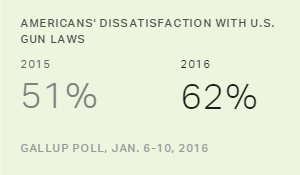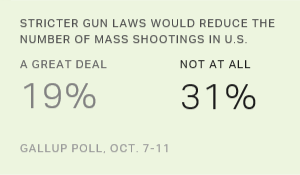Lawmakers in Washington continue to debate the passage of new laws relating to guns -- including preventing people on terrorist watch lists from buying guns, expanding background checks and banning the sale of assault weapons. As is always the case when representatives ponder legislation, it's a good time to review again what average Americans back home -- the people the lawmakers represent -- think about the topic.
There are two often-complex strains of attitudes toward guns in this country. One way to look at this is to talk about the public's views on what can or should be done collectively about guns, and then what can or should be done individually about guns.
At the collective level, we know that Americans are in favor of the government instituting new checks on the ability to buy guns, which theoretically would prevent those who have some type of official negative record on file from buying them. Americans have mixed feelings as to how effective they think these background check laws would be, but overwhelmingly are willing to go along with them.
I reviewed much of this literature here, after the San Bernardino shooting. Almost any proposal we put in front of the American people relating to background checks gets overwhelming support. A majority of Americans favor stricter laws on gun sales in general. Americans who are dissatisfied with gun laws favor more restrictions. Most recently, new Gallup research conducted since the mass shooting in Orlando underscores these attitudes. Americans overwhelmingly say that banning gun sales to individuals on terrorist watch lists would be effective in preventing incidents such as Orlando. A majority, albeit a smaller percentage, also say that restricting the sale of assault weapons would be effective in preventing mass shootings.
In this sense, Americans are saying to their representatives in Washington: "Yes, go ahead and pass new laws instituting restrictions and background checks on gun purchases, which we strongly favor."
At the same time, Americans as a whole continue to believe that collective entities such as the government and the police are not able to do enough (presumably regardless of any new laws that are passed). Americans believe that it is appropriate and effective for individual citizens to own and be ready to use guns personally to protect themselves and to reduce the incidence and bad outcomes of mass shootings.
Keep in mind that 41% of Americans tell us there is a gun in their home, and previous research shows that the dominant reason people say they own guns is for personal protection. Analyses of available data also show that gun sales spike after mass shootings and have apparently done so again since Orlando, underscoring this American belief in the efficacy of taking matters under personal individual control rather than putting all faith in collective entities.
I mentioned above that Americans believe restrictions on the sale of assault weapons would be effective in preventing future mass shootings. In the same survey, conducted just last week, almost the exact same percentage of Americans (64%) say that loosening state laws to allow more citizens to carry concealed weapons would be effective in preventing future incidents such as Orlando. In short, "yes" to collective restrictions and "yes" to actions at the individual level.
Previous research shows that by 56% to 41%, Americans believe the U.S. would be safer rather than less safe if more Americans carried concealed weapons after passing background checks and training courses. Over six in 10 say that having a gun in the home makes it safer rather than less safe.
The debate can ensue about the actual long-term impact of a significantly more "armed" America. But regardless of what experts might say, the average American believes that the long-term impact would be positive. Lawmakers and others who disagree that increased ownership of guns for private protection would improve safety or lessen casualties from mass shootings need to take these arguments to the average American, who at this point holds the opposite view.
Lawmakers and others who weigh in on the contentious gun issue need to recognize these two strains of thought held by Americans across the country. Lawmakers are the collective embodiment of the people they represent, and in theory should focus on making laws that they think reflect what their constituents want them to be doing -- laws that would be carried out by collective groups such as the police. In reference to guns, the public is willing to go along with the collective enforcement of almost any kind of restriction on the purchase of guns. But the public's trust in these collective entities' ability to protect them or to reduce horrific mass shootings only goes so far. Many Americans clearly default back to the belief that it is up to them individually to both protect themselves and to help prevent mass shootings, and that owning and carrying weapons themselves would do just that.



